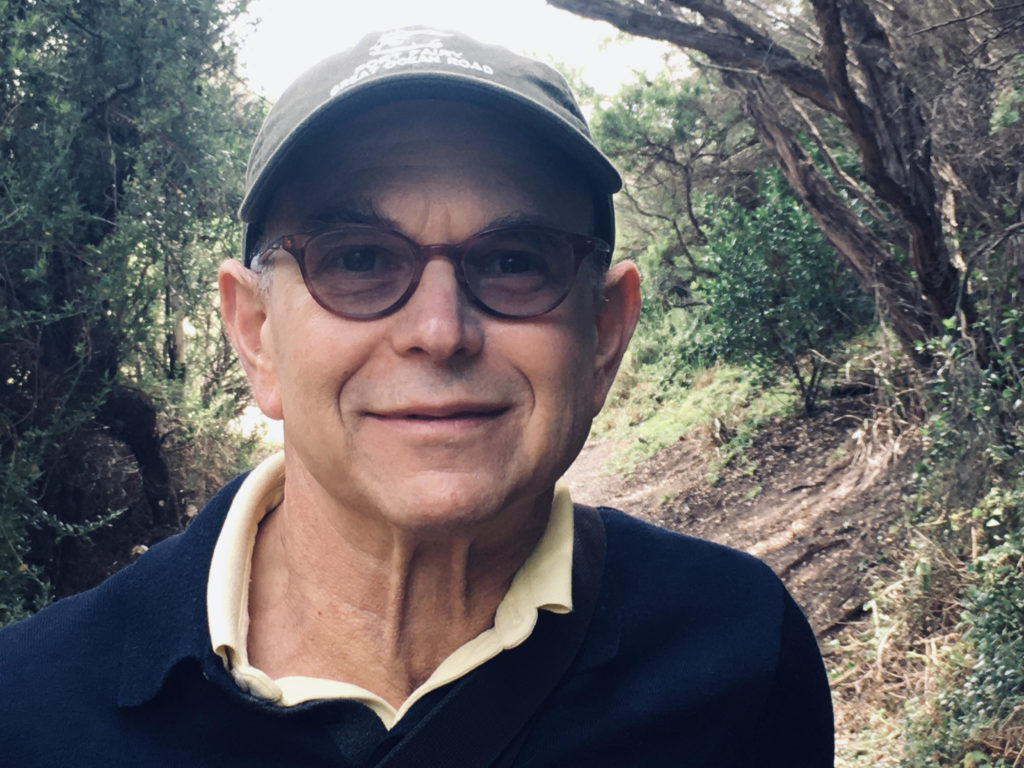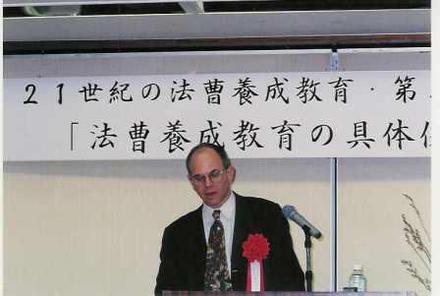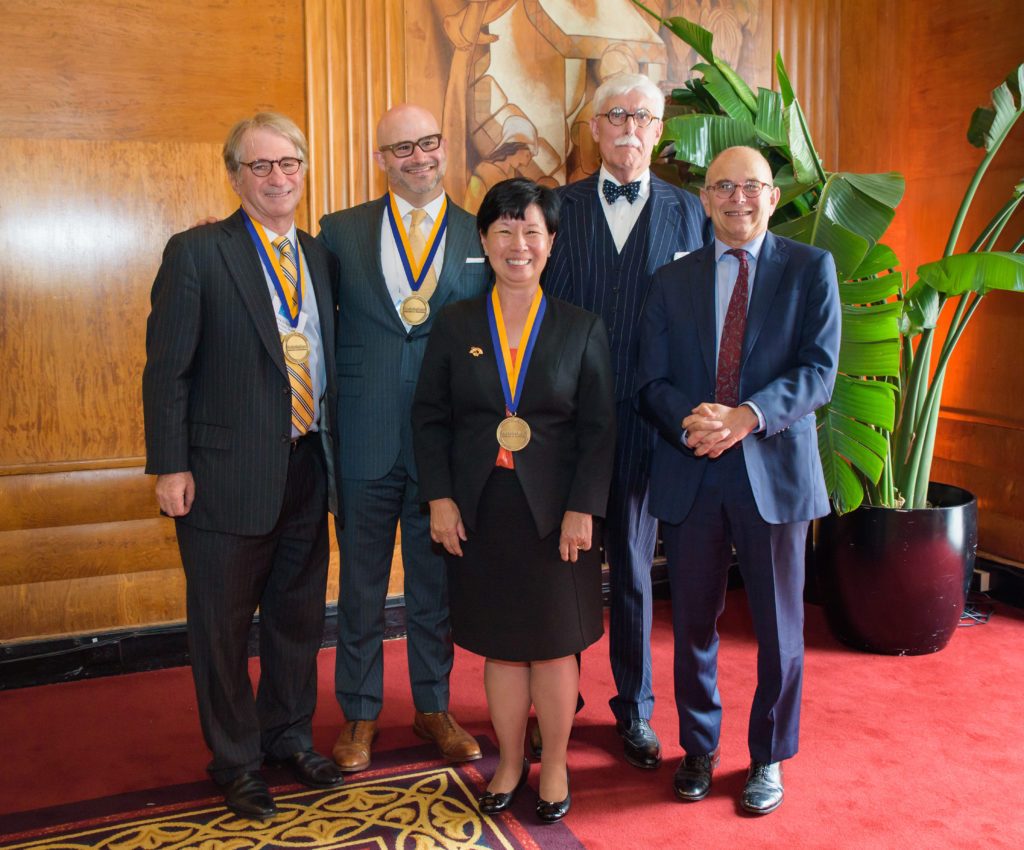I cannot now remember when I first met David. Probably, it was at a conference – an ASLH annual meeting, perhaps sometime in the 1990s. I have a strong memory of him at a session of the Law & Society Association meeting in Las Vegas (2005), laughing reproachfully at something deprecatory I had said about E.P. Thompson’s influence on legal history. But by then we were already well known to each other. Indeed, two years before I had tried to recruit him to become Director of the American Bar Foundation.

My problem in recalling our first meeting is that l knew of David long before we actually met in person; and this was not an effect of academic reputation preceding first encounters, it was because we shared the same treasured close friend, someone we had each known, quite independently, for many years; and from time to time our mutual friend had mentioned each of us to the other. And so instead of a clear initial memory there is a blur of acquaintance, which means that it is difficult to disinter the actuality of a first meeting from the sense of having always and already known someone. And perhaps I do not wish to attempt that disinterment. Perhaps I wish to claim that indeed I had always and already known David, tempus ex animo; known him for much, much longer than I actually did. Because, you see, David was someone so very well worth knowing.
(I always thought it wryly peculiar that the three of us – he, and I, and our mutual friend – never managed to meet together in the same place. Our distinct bilateral relationships remind me of the trio in John Schlesinger’s Sunday Bloody Sunday, a tale of deep intimacies, and of sweet rivalries, and of desperate awkwardnesses, all echoed in the haunting beauty of Così fan tutte’s “Soave sia il vento.” I always imagined that one day the three of us would contrive to meet. Together. But now we won’t.)
David Lieberman was born on May 21st, 1953, the son of George and Sylvia Lieberman. He was the youngest of three children, his siblings elder sisters, Lynne and Deborah. David’s father was a rabbi at the Central Synagogue of Nassau County, Long Island, and a scholar of comparative religions. After growing up in Rockville Centre, NY, David accompanied his parents to England on a paternal sabbatical, where he attended Saint Paul’s School in London, and then stayed on as an undergraduate to read history at the University of Cambridge, where he attended St. Catharine’s College. He studied with John Brewer, John Thompson, and Quentin Skinner, all of whom have written or spoken of his exceptional abilities as an undergraduate, and as a lifelong scholar, and as well of his personal kindness and endless good humor.
David graduated from Cambridge in 1974 with first-class honours. His degree opened the way to post-graduate study in England, but he decided to return to the United States, where he worked for a gruelling year for Henry Stern, the Manhattan councilman-at-large, and also considered a career in publishing and journalism. But the work did not suit David’s temperament. His plan, he told John Thompson, had turned out “a complete fiasco.” And so he returned to the United Kingdom, and to graduate studies. He joined University College London, where he worked with James Henderson (“Jimmy”) Burns (1921-2012), a Scottish historian of medieval and modern political thought. Jimmy was also an expert on utilitarianism and on Jeremy Bentham; he was the founding editor of Bentham’s Collected Works. Jeremy Bentham’s “Auto-Icon” still presides over the life of the mind at UCL, and Bentham would come to play a huge role in David’s intellectual life. John Thompson reports an encounter with David in the British Museum, in which David described his activities as a graduate student as “reading for the bar in eighteenth century England.” But by then he was also hard at work on Bentham’s vast corpus.
In 1978, David acquired his M.A. from Cambridge, and resumed his life at St. Catharine’s College, this time as a research fellow (1978-82). In 1980, half way through that fellowship, he completed his London University Ph.D. In 1982, he became college fellow and Director of Studies in History at Christ’s College, Cambridge. In 1984 he was appointed to the position of Acting Professor at Berkeley Law, where his primary affiliation was with the Jurisprudence & Social Policy Program (JSP). He would never leave.

The young Lieberman joined a formidable stable at JSP – Selznick, Nonet, Kadish, Messinger, Skolnick, Scheiber, Feeley, Cooter. Still, David made an immediate, unforgettable, impression on JSP’s students. “He walked into class with a mixture of confidence and humility that is difficult to describe and impossible to replicate,” writes Eric Feldman of his first encounter with the newly arrived Lieberman. “He made a few comments that were both uplifting and self-deprecating. He put everyone at ease by making us feel like we had known each other for years. And without any obvious transition or change in mood he invited us into his scholarly universe through a series of class presentations and discussions that were, in every sense of the word, brilliant.” His students thought he was an amazing teacher. One of them also thought he was really cute. Eventually, in 1987, Carol Brownstein and David Lieberman would marry. David’s best man on that occasion had been my best man seven years before. Our mutual friend.
To read the many tributes on the memorial wall created by David’s JSP colleagues in the wake of his death, to watch and to listen to those who spoke at the funeral service at Congregation Beth El on September 16th 2022, or at the memorial held by the law school three weeks later on October 10th, is to encounter a person who was deeply loved. Family, students, colleagues, and friends all use the same words and share the same memories. This was a man devoted to his family, and to his friends, and to the institutions where he lived, and worked, and prayed.
It is very easy in the world of the academy to lose oneself to the job, to the career, to the struggle for distinction; to the article, the book, the research that will make one’s name. It would go too far to claim that David did not feel that desire for the brass ring which haunts us all. He was human. And so we can count his achievements in the conventional academic sense. He was known internationally for his scholarship on Jeremy Bentham and the history of English constitutionalism, and he enjoyed the recognition that his scholarship brought. He lectured and taught all over the world: not only North America and England, but Australia, China, France, Israel. His first book, The Province of Legislation Determined: Legal Theory in Eighteenth-Century Britain (1989) reappeared in paperback in 2002. He also produced annotated editions of works by Henry Home (Lord Kames), and Jean Louis Delolme, in 1988 and 2007. His research on Bentham continued throughout his life, resulting in a stream of articles. And David was also a consummate essayist. One of my personal favorites is his “Contract before ‘Freedom of Contract’”, which appears in the volume The State and Freedom of Contract (1998), edited by David’s JSP colleague Harry Scheiber. At Berkeley Law he was successively the Jefferson E. Peyser Professor of Law (2000-13) and the James W. and Isabel Coffroth Professor of Jurisprudence (2013-2022).

But David did not allow the brass ring to distort his life. John Thompson remembers that when David left his undergraduate career at Cambridge to turn to nonacademic work in New York, he became quite quickly disenamored of the aggressiveness of the city’s life, of how “you are supposed to ‘sell yourself’ at all these interviews.” Thompson even uses the word “hostile” to describe David’s disquiet, which tells us how extreme his sense of disturbance at the time must have been, for “hostile” is not a word that anyone who knew David would think belongs in the same sentence as “Lieberman.” Plainly, this life was not a life that David desired. It lacked tranquility. Perhaps most important, judging from the life that David was to lead as he grew older, it lacked balance.
David cared for others. He cared for Carol, and for his children, George, and Hannah, and Aaron. He cared for his extended Brownstein-Lieberman family. He cared for his friends; he cared for his colleagues; he cared for his students. And he cared for the institutions of which he was a part: for Temple Beth El; for the law school; and for Berkeley (or “campus” as we like to call it) where, amongst many other activities, he served on, and chaired, the infamous “Budget” Committee. He cared for JSP; he cared for the Kadish Center for Morality, Law, and Public Affairs, which he helped to create and sustain. His caring knew few bounds. As a former student of his, Megan Wachspress, writes, “David was just a good person: good to those around him and wanting only good for the world, in a way that I think is actually quite rare. Rarer still for this open-hearted goodness to be combined with his sharpness, of both humor and thought. The world is a much worse place without David, but it is a much better place, and my own life is so much better, for having had him in it.” If one were to read all of the memories and tributes recorded on the memorial wall, one would find there the same overpowering sense of gratitude, and of loss. Perhaps caring for others was David’s way of resisting the call of the self and its ambitions. If so, all of us who knew him are the beneficiaries of his resistance.
In 2016, David suffered a terrible accident whilst riding his bicycle. It took him years to recover and left him frail, but indomitable. Five years after that accident, more or less restored, he announced he would retire. When the time came, we held a dinner for him, and at the same time for the eminent criminologist Frank Zimring, who was also retiring. As these things go, it was a relatively quiet affair. Was covid still lurking? Should we wear masks? But it seemed to us that a quiet sendoff hardly mattered: after all, we could look forward to having him around for years.
Four months later David was dead. He died in a hiking accident in far northeastern California. He loved hiking. He was alone on a trail, and he must have lost his footing, and the fall killed him. Anyone who hikes on alpine or mountain trails knows how easily that can happen. The embrace of the landscape is seductive. One forgets where to put one’s feet.
In my last exchange with David, about an item of campus business that required his advice, he wrote, “I’m about to take off for the rest of the week and will be in the mountains and off the grid. I apologize for not getting to this sooner. The problem is chronic!” I laughed, for it struck me then that he was very happy; happy to be going to a place that he loved, Lassen Volcanic National Park, with people that he loved, Carol and their son Aaron; happy to be retired; happy to be looking forwards, to a life after Berkeley.
David was 69 when he died. I had always thought he was older than me. It was a reasonable assessment of our relative displays of maturity, but it turned out I was wrong. I am two years older. His death left me bemused. For several days I found myself thinking the news must have been some kind of mistake, or that in believing it I had made a mistake. I was more than half convinced that David would suddenly turn up at my office door, wondering what I was doing writing to other people about his “death,” wondering what all the fuss was about. When faraway friends wrote to me on hearing the news, I told them that JSP (I meant everyone concerned in our program) was “wandering around in a daze, muttering to itself.” For a while, until the institutional niceties clicked in, we were all simply very disoriented. I think the institutional niceties helped us. They certainly helped me. One learns that there is a deep rhythm to life and death, and that our modes of marking that rhythm are incomparably important. I had never before realized how comforting Kaddish can be.
Anyone who is my age will have become used to the death of others whom we have known. Friends of my youth, from school, from my undergraduate years at Oxford, from graduate life at Johns Hopkins, have been dying for years now – some from their “poor lifestyle choices” (drugs, alcohol), others prey to sudden and tragic accidents, or unanticipated health events. Family members die in the natural course of growing old. So death is no stranger. Still, it was terribly confusing suddenly to find David turn up on the list. David had been a survivor. He had survived severe illness (the obligatory brush with cancer). He had survived his bike accident. He was supposed to grow old and cantankerous in retirement, enjoy his pension, and his life with Carol. He was supposed to be a continuing part of the scenery of my life, not some kind of bosom pal, just a dependable presence. David’s death made me think hard – about how I think about others, about my “lifestyle choices,” about my own tendencies to solitariness and simultaneous dependence on familiar presences. About ambition, and about friendship.
Megan Wachspress is right. David was a good person. That is not all he was, but to be remembered as a good person by so many people is a marvelous testimony to a life. It signifies a life well lived. At David’s funeral service, in her grief, Carol read Auden’s poem, Funeral Blues, the last line of which is “For nothing now can ever come to any good.” A friend said to me afterward that her voice was an extraordinary keening cry, a widow in the agony of grief. Perhaps there is solace for Carol, for David’s children, for all of us, in realizing how much good David left behind him, and how much those he left might gain from his example, if we try.

